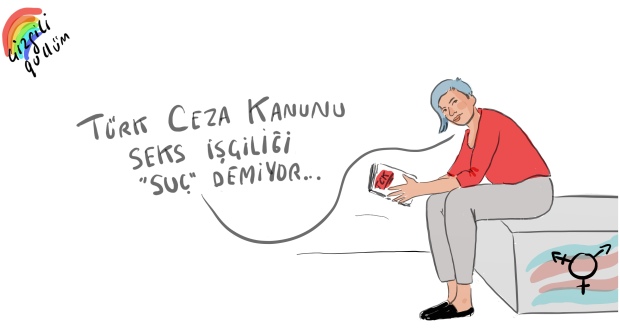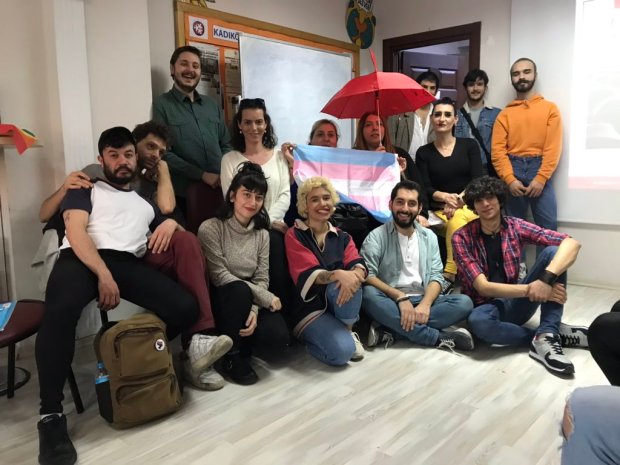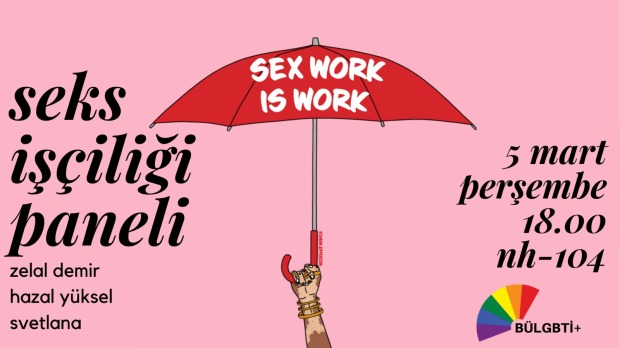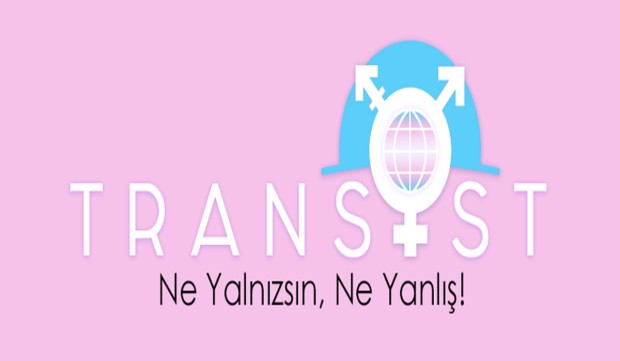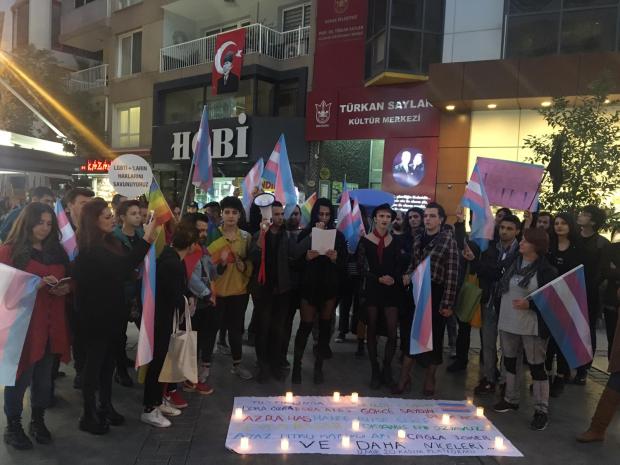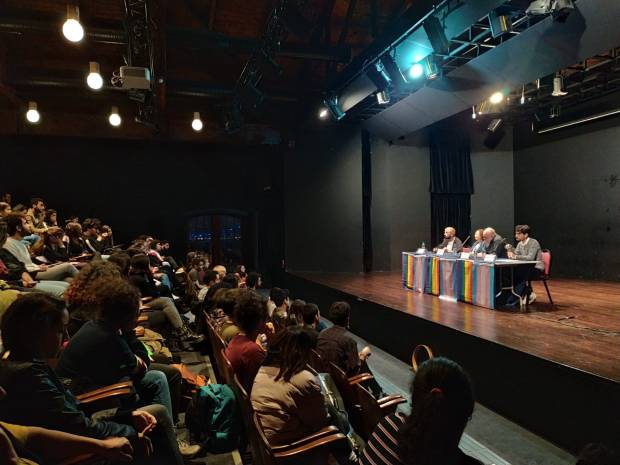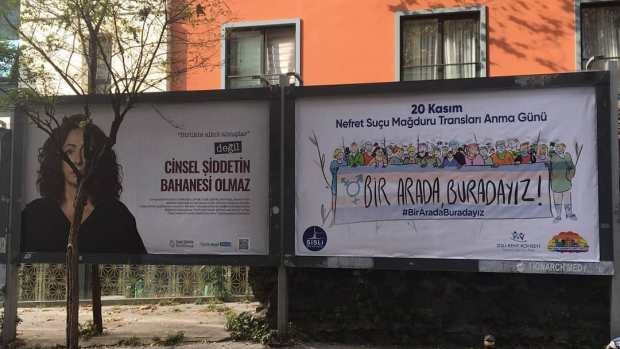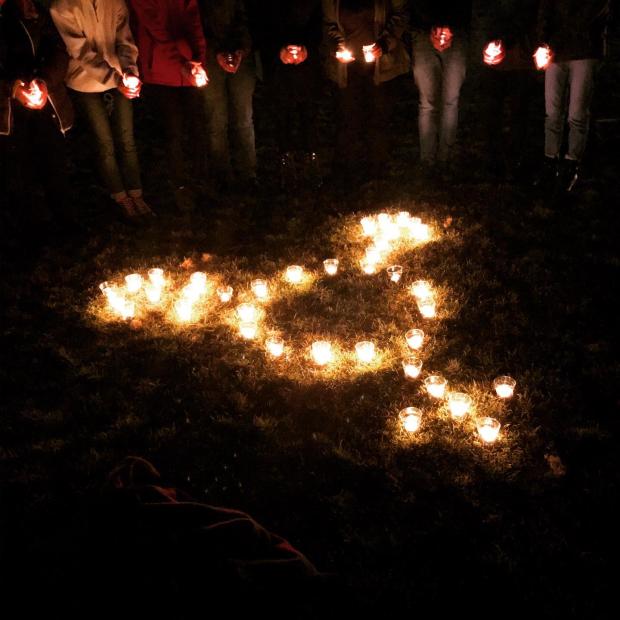The Confederation of Public Employees’ Trade Unions (Kamu Emekçileri Sendikaları Konfederasyonu, KESK): “It is not possible to think that hostility towards women’s liberation and LGBTI+ individuals’ existence is separate from the dominant male-oriented, heterosexist viewpoint.”
Source: “Propagating anti-LGBTI+ policies is against the principle of secularism” (LGBTİ+ düşmanı politikaları ülkenin en kılcal damarlarına kadar taşımak laiklik ilkesine aykırıdır) Kaos GL, 7th of May, 2020 https://www.kaosgl.org/haber/lgbti-dusmani-politikalari-ulkenin-en-kilcal-damarlarina-kadar-tasimak-laiklik-ilkesine-aykiridir?
In relation to the Friday khutbah of the Directorate of Religious Affairs, which pointed out LGBTI+ individuals and people with HIV as the target for hate, the Confederation of Public Employees’ Trade Unions (KESK) Executive Board has issued a statement. The board said: “It is not possible to think that hostility towards women’s liberation and LGBTI+ individuals existence is separate from the mentality which defines women only within the family and through men, seeing interpersonal relations only as the way of breeding and the reproduction of labour power and “nation” which is defined within a nationalist-conservative framework, and the dominant male-oriented, heterosexist viewpoint.”
The full statement of KESK is as follows:
“The statements of Ali Erbaş, the Head of the Directorate of Religious Affairs, targeting homosexuals, people with HIV, and extramarital relations in the Friday khutbah and making them the scapegoat for the pandemic, are clearly disgraceful and hateful towards a certain section of society and points them out as the target for the masses.”
“In the Article 10 of our Constitution, it is regulated that everyone is equal before the law regardless of language, race, colour, gender, political opinion, philosophical belief, religion, sect and similar reasons. The khutbah of the Head of the Directorate of Religious Affairs constitutes a crime of hate and discrimination in the Article 122 of the Criminal Code, as well as a violation of the principle of equality regulated in that article.”
“After the reactions to the crime committed by the Head of the Directorate of Religious Affairs, the point we have reached today has ceased to be only that of a hate crime by a civil servant, but also that the belief principles of a religion have been given more power than the constitution and law. Instead of acting against this crime, which was committed directly by the person holding the title as a head of a government institution, the government also supported the crime with the statement that “any attack towards the Directorate of Religious Affairs is deemed to be made against the state”; and investigations have been initiated against the bar associations whose duties are to protect and promote human rights; the bar associations have been accused of hostility towards Islam and targeted directly by the government. The worst part of this [the government’s] statement is the discourse stating that the state is now a theocratic state and identifying the state with the Directorate of Religious Affairs. This discourse is a clear violation of the principle of secularism protected by the second Article of our Constitution. ”
“The Article 4 of the Constitution of the Republic of Turkey lists the Articles that can not be replaced and about which even an offer to replace cannot be made. One of these articles is “The Republic of Turkey is a democratic, secular and social state governed by rule of law”. Neither the President nor the Head of the Directorate of Religious Affairs, who identify the state with themselves and the religious affairs, is above the Constitution. Every institution and establishment can be criticized and the Directorate of Religious Affairs is not above that. Presenting the criticisms towards the Directorate of Religious Affairs as hostility to Islam is to cover its ideological function, to lead hatred and hostility from a section of society against those who criticize the Directorate, and to cause new Çorum and Maraş massacres.”
“The Directorate of Religious Affairs today is clearly a fatwa institution that works to legitimize the policies of the government; it desires to be free from all kinds of criticism by being sanctified and to wear some kind of immunity armour. The Directorate of Religious Affairs, which is affiliated with the Palace [the government], sees itself above the laws and the constitution and plays an important role in the religionization of all social bonds and relations through the fatwas it gives, just as the President’s orders are seen as laws. ”
“On one hand, the Corona pandemic in Turkey, just like all over the whole world, has increased the effects of the economic crises that we deeply suffer from. Unemployment and poverty have spread, the people have been unable to bring bread home. The right to access healthcare and education has been commodified through the mentality of “receiving service according to your money” due to the marketization of public services. The health and future of the people are in danger due to the fact that they cannot reach these services, and monthly receiving 1168 TL is deemed to be enough for employees who have been forced to take unpaid leave. On the other hand, the Directorate of Religious Affairs violates the rights of the people with its budget of 11,5 billion TL, which exceeds the budgets of the 8 other ministries and several executive institutions. With its luxury spending of 2,6 million TL for luxury cars and 1,8 million TL for the fuels of these cars over the last 3 years and with its donation campaigns promising acceptance into heaven, it works as an ideological tool in order to spread illegal, misogynist, anti-child, and anti-LGBTI+, but pro-capitalist policies and to make these policies be accepted by society without any reaction.
“How is this happening?
“Through the khutbahs at the mosques by the mufti’s office, saying that strikes are not permissible in the religion and that “any act of decreasing the profit and profitability shall cause the employee to hold a serious religious responsibility”, after the employees were fired because they were members of the labour unions,
By saying that the massacre in Soma was fate and natural and prevented the people to claim their rights,
By obliging the contribution to the donation campaigns under the name of the fight against the pandemic and asking the receipts for the donations to be sent to the mufti offices,
By giving fatwas saying that 9-year-old girls and 12-year-old boys can get married,
By saying that the lust a father feels for his own child is not illicit by the religion, but the shaking hands with women is a sin,
By writing in the Encyclopaedia Islam, which they issued themselves, that stepfathers can have [sexual] relationship with young girls,
By stating that feminism is immorality and recommending women “to look for the wrong in themselves…”
“The Directorate of Religious Affairs functions as an ideological tool for AKP to reshape society with the religious rules of one sect through its giant budget consisting of the taxes collected from the public by violating the Constitution’s Article 136 which determines its duties and responsibilities, as well as the principle of secularism. It is not possible to think that hostility towards women’s liberation and LGBTI+s existence is separate from the mentality which defines women only within the family and through men, seeing interpersonal relations only as the way of breeding and the reproduction of labour power and “nation” which is defined within a nationalist-conservative framework, and the dominant male-oriented, heterosexist viewpoint.”
“The state must be neutral and equidistant to all religions. The ties that make up the society cannot be based on a religious understanding of the sovereignty of a single sect. The ties that make up the society can be defined by a secular and rational standpoint based on equality and the peaceful coexistence of differences. This is the requirement of the principle of secularism, and only in this way can freedom of belief be guaranteed.”
“LGBTI+ individuals exist, women exist; they have the right to live freely, as equal citizens of this society. Being completely distant to science, seeing the pandemic as a divine punishment, and functioning to support AKP’s pro-capitalist policies which are hostile to labour, women, children, and LGBTI+ individuals, to spread them throughout the country, to prevent the reactions about them, and to legitimize them, the Directorate of Religious Affairs violates the principle of secularism and is one of the biggest obstacles to equal citizenship and basic rights and freedoms.”
“We strongly condemn the attacks on Ankara and Diyarbakır Bar associations which have made statements on the government’s attitude clearly violating the principle of secularism, the rule of law, and the independence of the judiciary, which are protected by the Constitution, in order to fulfil the requirements of the secular and social state, to protect and improve human rights and freedoms. We do not accept that the law is being made a threat and an intimidation tool for those who criticize AKP policies and the Palace regime and for those who do not think the same way as the government. The government, which cannot tolerate any view and criticism other than itself, must stop using law as a stick to discipline the organized parts of the society.”
“We call on all the state institutions and administrators, especially the government, to comply with the constitution and international agreements, and to respect the rule of law. We will support the struggle to establish a secular, democratic, rule of law that respects human rights, and will fight against the governing mentality that is based on discrimination, hatred, grudge and enmity among different parts of the society, and which seeks to religionise all social relations.”


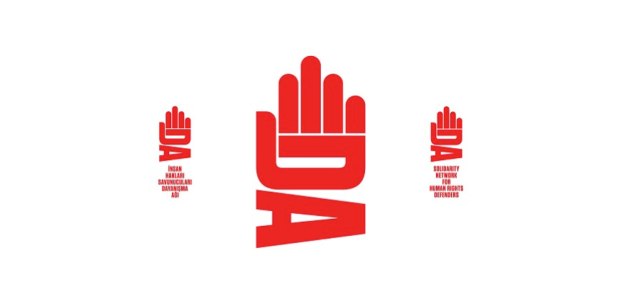
 “Of course, trans people exist in academia too!”
“Of course, trans people exist in academia too!”



